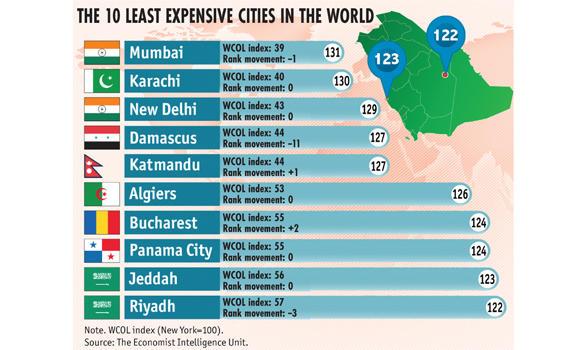
Jeddah, Mar 5: Riyadh and Jeddah are two of the least expensive cities in the world when it comes to living costs, says a new report from the Economist Intelligence Unit (EIU).
The Worldwide Cost of Living is a biannual EIU survey that compares more than 400 individual prices across 160 products and services including food, drink, clothing, household supplies, home rents, transport, utility bills, private schools, domestic help and recreational costs.
The EIU study said that Riyadh and Jeddah offer cheap cost of living in a more stable environment, with price controls on staples in Saudi Arabia continuing to guarantee low prices for many goods. Both cities were also rated as being good value for money when it came to buying other items like bread and cigarettes.
The research found that petrol prices — a key component of the index — in Saudi Arabia had actually fallen in both cities from an average $0.24 per liter 10 years ago to just $0.13 now. This compared with an average of $1.73 per liter in Singapore, ranked as the world’s most expensive city.
Singapore outstripped Tokyo as the world’s most expensive city for expatriates, with the EIU citing a strong Singaporean dollar, high price of utilities and cost of car ownership as among the factors contributing to Singapore taking the top spot.
The report said while Asia is home to some of the world’s most expensive cities, it is also home to many of the world’s cheapest cities. The best value for money is in India, Pakistan, Bangladesh, Nepal and Sri Lanka.
Mumbai is the cheapest location in the survey and three of the four cheapest cities surveyed are from Pakistan, India and Nepal.
These cities are only joined by Damascus because of the unfolding crisis in Syria and its impact on exchange rates.





Comments
Add new comment